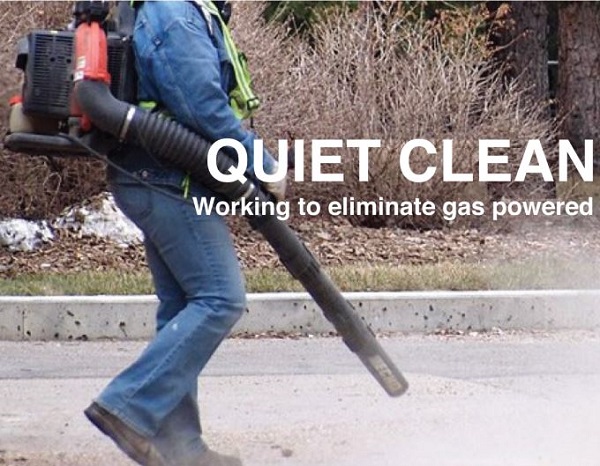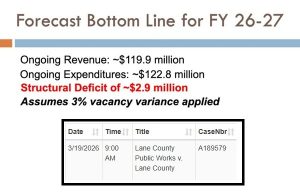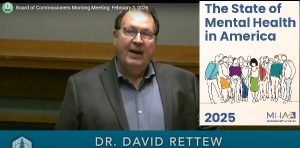Eugene group looks for ban on gas-powered leaf blowers
6 min read
Councilor Matt Keating misses a presentation on health hazards from gas-powered leaf blowers. At the Southeast Neighbors board Feb. 7, Ashwini from Quiet Clean Eugene.
[00:00:10] Ashwini Srinivasamohan (Quiet Clean Eugene): Hi everyone. I’m Ashwini. I am here with Steve. We started a group just very recently called Quiet Clean Eugene to address this issue with gas-powered leaf blowers.
[00:00:22] Steve Morgan (Quiet Clean Eugene): My name is Steve Morgan. I have a degree in Environmental Health and Safety from Oregon State, and I worked at Forrest Paint for over a decade as environmental and safety occupational safety manager. I also was on the City of Eugene Toxics Board representing Forrest Paint. Then I transitioned to fence building and landscaping.
[00:00:44] So I have expertise in landscaping. I actually bought one of these gas leaf blowers. And so, if you have any questions about how the landscapers are going to feel about this, I can help answer those questions.
[00:00:58] Ashwini Srinivasamohan: So what we really want to do is talk about why we all ought to be a little bit concerned about gas-powered leaf blowers. It’s been made abundantly clear that through, like, decades of research that there are some real impacts on the environment as well as the health of the workers associated with it and the general well-being of communities, which has, what, it’s inspired, like, about, now, 170 different types of ‘Quiet Clean’ initiatives throughout the country.
[00:01:31] Steve Morgan: Obviously there’s a lot of bad things associated with these leaf blowers: Toxic exhaust emissions. The industrial plumes get blown up. They get dust and animal feces and damage to the soil.
[00:01:45] Refueling spills contaminate the soil. These two-cycle leaf blowers, you have to mix the gas and the oil, and you could spill, drying out the soil.
[00:01:54] The most interesting issue is the non-hearing-related health effects of noise. This irritation that you get is, actually, your heart rate is increasing, your blood pressure is going up, so it causes heart disease and other health conditions besides hearing loss.
[00:02:14] Just one hour of gas-powered leaf blower equals 1,100 miles, I think it was a Toyota Camry.
[00:02:24] Ashwini Srinivasamohan: There are some very real health hazards due to exposure to these gas-powered leaf blowers emissions.
[00:02:30] A study recently connected the exposure to the fine particulates to the increase in the likelihood of deaths from COVID. I mean, there’s just a spectrum of different studies that have been conducted around this topic. There is a lot of interest in this because it’s not necessarily something that can just be written off anymore.
[00:02:48] We all know that loud noise is, you know, annoying—it damages our hearing over time. But there’s just more and more evidence that this exposure to noise can really have cognitive and physiological impacts. And even the development of children, workplace productivity, and just general safety and livability of our communities.
[00:03:10] Eugene passed this ordinance in 2014, and like many other cities that have been doing that, set it at 70 decibels. And with one exception, of leaf blowers that are being operated in parking lots that are in commercial areas. They’re kind of exempt from any rules.
[00:03:31] So 70 (decibels), right? 70 (dB) is, like the, according to this, like the uppermost limit for being just moderately safe and one of the lowest gas-powered leaf blowers is already at 60 (dB).
[00:03:47] Steve Morgan: I’m really concerned about the landscapers out there that are operating these gas-powered leaf blowers with 100 decibels at their ear right here with these backpack blowers.
[00:03:59] And when I drive by and I see ’em, they could have earplugs in them, but they’re not, I can see guys that are not wearing earmuffs.
[00:04:05] In addition on the Eugene regulation, you’re not allowed to operate two gas-powered leaf blowers within 100 feet of each other.
[00:04:17] Well, I can just think of a couple properties there that violate it. So nobody knows what that rule is. And I can’t imagine a landscaper actually knowing this, ‘cause I didn’t discover this until the other day.
[00:04:35] Ashwini Srinivasamohan: It had proven very difficult to enforce if done via this kind of noise platform. So that brings us to crafting a policy package for phasing out leaf blowers that specifically takes into account the needs of Eugene.
[00:04:50] So we have lots of different examples. You know, (Washington) D.C. of course, is the first one that has successfully implemented it. And from 2019 the law passed and had a three-year rollout with different incentive programs built in so that it would help companies to adjust to it.
[00:05:08] Emily Fox (Southeast Neighbors board): The gas leaf blower, it says that affects 90 homes. Maybe you’re 20 feet away, 50 feet away—it can affect you?
[00:05:18] Steve Morgan: These leaf blowers actually emit a different frequency, a lower frequency that travels a lot farther, like two blocks or a block away from the guy with the leaf blower. And it’s actually a more irritating sound than a higher-frequency sound.
[00:05:37] So these leaf blowers can impact a lot of homes because if you can hear ’em two blocks away and you draw a circle, then there could be 90 homes, I guess, in that circle, is what they’re alluding to here.
[00:05:52] Emily Fox: And has there been any studies with how it affects birds?
[00:05:55] Steve Morgan: Yeah, I can tell you right now. I stopped raking my leaves at my house and I come home the other day and there’s a red-breasted sapsucker, two mourning doves, and a scrub jay in my yard over there in those trees with the leaves that I didn’t rake. So it has a huge effect on the wildlife in your yard. It’s going to attract more birds ‘cause there’s more worms under the leaves and little critters for them to eat.
[00:06:24] Also I’ve been thinking about dogs. Okay. We got a lot of pet owners. Dogs have really good hearing, so I’m wondering how many dogs are being affected by these leaf blowers that we don’t even know about.
[00:06:38] Jess Roshak (Southeast Neighbors board): Why target just leaf blowers? Why wouldn’t you talk about all two-stroke engines, like scooters with them, or chainsaws with them, or motorcycles with them, lawnmowers with them?
[00:06:51] Ashwini Srinivasamohan: So why gas blowers, right? The gas-powered leaf blower, two-stroke engine category of equipment is definitely the most visible and empirically-studied evidence of a two-stroke engine being detrimental.
[00:07:06] And motorcycles and automobiles, we’ve had laws and regulations for decades around two-stroke engines. So it just seems like a natural order of progression.
[00:07:16] Some of our friends at Quiet Clean Portland, they’re working with other folks to put out a revised HB 2970. And this is a strategy that we’ve seen other cities use as pushback, when the grassroots campaigns have tried to lobby for a total ban, is to offer this kind of restriction on use, or a ban on sale as a concession, or a middle ground, or a steppingstone for a larger ban.
[00:07:45] And if you’re interested, we’d really love people that have more time to dedicate (in this steering committee of three) to make this a more concerted effort. And some of the things that we really want to do is to keep working with the city council to get this policy moving, but also some community education.
[00:08:01] And (SEN Co-chair) Devon (Mann) has my contact info, so thank you. (Thanks. Thank you so much.)
[00:08:06] John Q: A member of the public identified as Terry asked in a text message when Councilor Matt Keating would be speaking.
[00:08:15] Jess Roshak (SEN board): There is a member of the public here who is looking for Matt Keating and wondering where he is, since he’s on the agenda. (Oh.)
[00:08:23] Dennis Hebert (Southeast Neighbors co-chair): He’s not going to be here this evening. Matt is not going to be here this evening. So…
[00:08:30] Emily Fox: ‘Why?’ the person says.
[00:08:32] Dennis Hebert: He’s a state of the state address or something, or like that. That’s all I heard.
[00:08:41] Emily Fox: Who is iPhone? (A member of the public.) (General public.)
[00:08:44] John Q: In the first meeting after the board voted for a full accounting about behavior that Greg Evans called racist, Councilor Matt Keating is a no-show.
[00:08:53] Terry wrote another text message. Quote: “Matt doesn’t reply to average citizens. Dealt with that during the pandemic, and he lived next door.”






